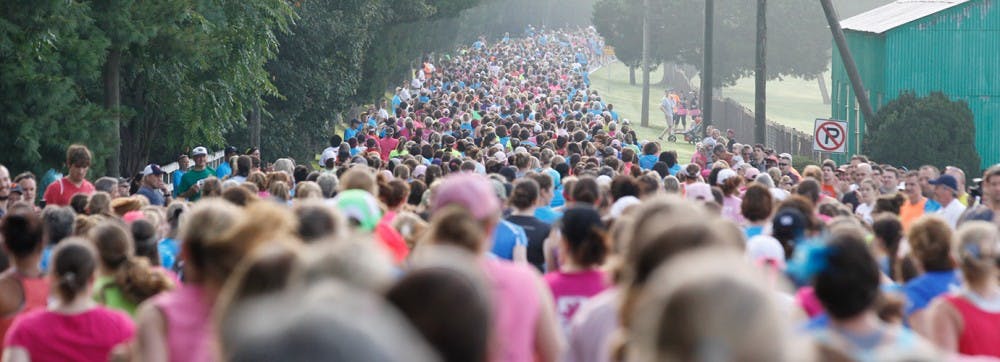University students likely think of Foxfield as synonymous with a day of red cups, pastel clothing and little to no (horse) racing. However, every Labor Day Saturday, this location is home to the largest all-women’s race in Virginia — the Charlottesville Women’s Four Miler.
Hosted by the Charlottesville Track Club, the race will start and finish at Foxfield and should include over 3,000 runners. Through its 24-year tenure, the race has seen over 48,000 runners and has raised $3.5 million for the U.Va. Cancer Center Breast Care Program. Last year alone, the Four Miler raised $310,000 for the program.
The money goes towards funding care for breast cancer patients in Virginia, many of whom are treated at the University hospital. In the past, funds have gone towards things like paying for mammograms and doing on the spot readings so patients do not have to make multiple trips to a facility where they can get treatment. This is particularly helpful for women forced to walk or find a bus to transport them to a treatment facility.
“Especially in southwest Virginia, it’s hard to get [patients] to come back,” race founder and director Cynthia Lorenzoni said. Her mother suffered from breast cancer.
Although the Four Miler has been around since 1983, it has only been connected to the U.Va. Cancer Center since 1996. Today, the end of the race features the “Motivational Mile,” in which anyone can donate $50 to put up a poster in memory of a patient or survivor of breast cancer.
Cynthia’s daughter Audrey Lorenzoni spoke to the importance of this part of the race.
“One of the coolest things about the race every year is watching the women finish and finish in groups,” Audrey said. “A lot of the women will pull down their motivational mile posters for their mom or whoever they made the poster for and will cross the finish line holding hands with it.”
The race offers the option to sign up as an individual or as a team. Some of the teams are mother-daughter pairs.
Audrey has been volunteering with the race since she graduated from the University in 2009, but her mother has been involved since the race’s inception. Cynthia and her husband Mark Lorenzoni founded Ragged Mountain Running Company, a shoe and running apparel store located on Elliewood Avenue, in 1982. They began looking into putting on races almost immediately and were disappointed by the lack of races for which the police shut down roads. The Lorenzonis went to the track club, where Cynthia was on the board at the time, and asked why there wasn’t a race where the roads were closed down.
“They go, ‘they’ll never let you do it,’” Cynthia said. “I think they had tried and had a little problem. So we were like, ‘when was the last time somebody asked, right, because you won’t know until you ask.’”
The couple got the race approved and decided to have it at Foxfield, where there was a relatively flat stretch of Garth Road.
The race runs a mile west from the main fate of Foxfield and then goes back past Foxfield and runs a mile towards town, then comes back again. These two hairpin turns and the common middle allow runners to see and cheer for other participants going the other way. First-year nursing graduate student Rachel Ward said this is one of the best parts of the race. Ward first ran the Women’s Four Miler when she was eight and has won the race seven times since then.
“You never feel isolated,” Ward said. “It’s awesome because there’s always, always people cheering for you in both directions. You’re cheering for them; they’re cheering for you.”
Ward’s favorite part of the race is the gradual downhill in the last mile, where her high school cross country team always stands to cheer. Ward also works at Ragged Mountain Running Company with the Lorenzonis. She will not be participating in the race this year due to injury, but will miss the experience.
“This is an experience you can’t get anywhere else and something that no one should leave Charlottesville without having done,” Ward said. “It’s so much more than a foot race. It’s part carnival; there’s just like this festivity about it that I feel like is only rivaled by a concert or some other kind of event.”
Afterwards, participants and volunteers often hang out at Foxfield to eat, listen to music and enjoy the day. Although the race takes only female runners, anyone can volunteer. The all-women environment is meant to make the race a unique experience.
“It’s very empowering; it’s very emotional,” Cynthia said. “When the gun goes off it’s just a sea of women.”
Cynthia’s experiences with all women’s races later in life did lead her to want to put on a similar race.
“I was running in all these all-women races back in the early ‘80s all over the country and it was totally different,” Cynthia said. “The running boom was really getting started.”
All women’s races have not always been the norm for Cynthia, who ran competitively for years. In high school, she would show up to run races and not be allowed to enter. The race officials would let women run the course, but often refused to give them race bibs and count them as participants. In high school, she ran in the woods because she didn’t want anyone to see her running. Since, she has competed all over the country, including racing in the Olympic trials. Today, she runs for enjoyment.
The race will take place this Saturday, Sept. 2 at 8:00 a.m. The race welcomes people of all skill levels and final registration will take place at John Paul Jones Arena Friday, Sept. 1 from 4 p.m. to 7 p.m.







